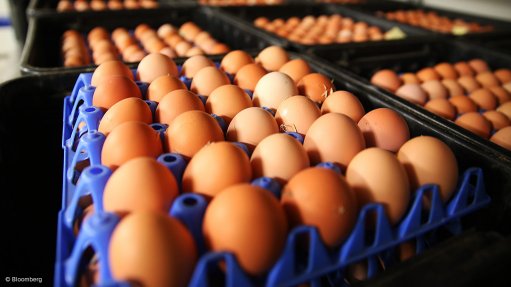
Citing unfavorable trading conditions and a challenging economic environment, JSE-listed Quantum Foods reported a loss in headline earnings a share decreased to 15c for the six months ended March 2016, down 11c from the 26c a share reported in 2015.
Cash outflow from operations amounted to R53.9-million in 2016, while group revenue increased by 7.9% to R1.8-billion.
Revenue from the group’s South African operations increased by R155.7-million, mostly in the animal feed segment, owing to increased selling prices and volumes, following the acquisition of the Olifantskop feed mill in February.
Revenue increased in the broiler, eggs and layer livestock segments, where improved selling prices contributed more than main product categories, which recorded lower volumes.
Revenue from operations in the rest of Africa decreased by R22.9-million, particularly in Zambia, following the exit of the distribution centre business in the previous period, and contributed 4% to group revenue for the six months.
Cash operating expenses increased by 5.1% in 2016, with the decrease in expenses owing to the sale of the Hartbeespoort abattoir offset by inflationary increases and the cost of additional business units incorporated in the period under review.
Operating profit decreased by R5.8-million to a profit of R76.5-million for the six-month period.
Capital expenditure for the period, excluding the acquisition of the Olifantskop feed mill, amounted to R45.9-million, R40.7-million of which was incurred on the table egg expansion projects in Zambia and Uganda.
OPERATIONAL OVERVIEW
Quantum’s animal feed segment performed well in a volatile raw material market. Volumes sold to third parties continued to increase though margins were slightly lower.
The egg business also did not perform well. High input costs, weak farm performance and below-standard packing station efficiencies led to a negative financial result.
In the layer livestock business, volumes increased, but margins shrank as price increases could not compensate for high raw material costs.
The company noted that the financial performance from the rest of Africa was disappointing, however, the performance on an operational level was satisfactory.
The remainder of the 2016 financial year was expected to be characterised by continuing high raw material costs.
Quantum expected the feed and broiler businesses to remain stable contributors, while the egg business was expected to remain under severe pressure, owing to both the current industry challenges as well as the lead time for significant improvement in the farm performances of the group.
Throughout the rest of Africa, conditions remained difficult owing to exchange rate volatility and the slowing of the Zambian economy. However, the company looked forward to positive contributions from the completed expansions during the last three months of the current financial year.